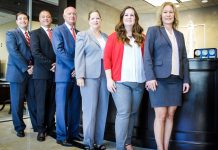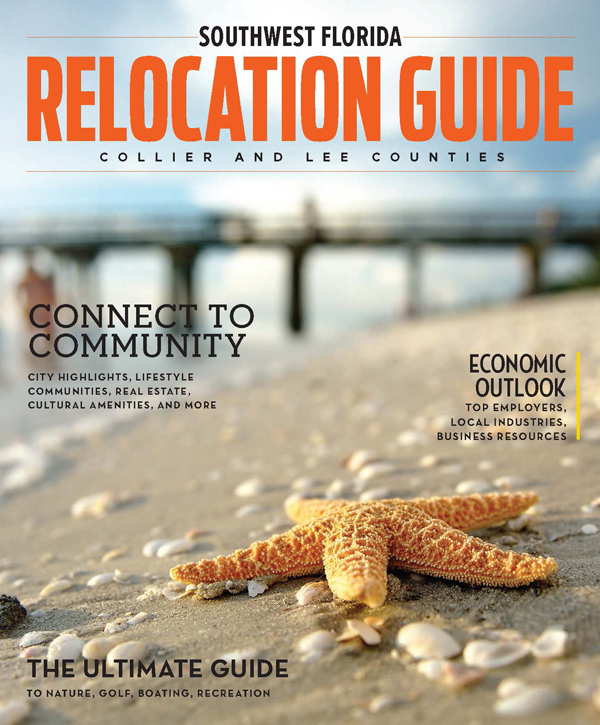
There’s a modern misconception that Southwest Florida’s economy is “a three-legged stool” propped up by tourism, agriculture, and construction. While that held true for a long time, it’s no longer the case. And that’s great news.
The five-county region’s economy is a dynamic and evolving engine fueled by a labor force of 590,063, according to the 2020 Workforce Now study, created by the Regional Economic Research Institute (RERI) at Florida Gulf Coast University Lutgert College of Business in partnership with Hodges University and Florida SouthWestern State College.
The Southwest Florida region is made up of Lee, Collier, Charlotte, Hendry, and Glades counties. The five largest industries by employment are: retail trade, accommodation and food services, health care and social assistance, construction, and administrative and waste services, according to the report.
Diversifying market sectors is the name of the game in economic development to build a robust, sustainable economy—a grueling lesson learned during cyclical booms and busts—so regions aren’t dependent on a few industries.
There are several forces shaping the makeup of the local economy—importantly, a steady population increase. The region’s population growth has exceeded the state growth by 16.9 percent since 2010. Since 1990, Collier County’s compounded population growth average was 3.2 percent per year and Lee County’s grew by 2.8 percent annually. These rates are expected to consistently gain at least 1.2 percent annually in Collier County and 1.4 percent in Lee County through 2045, according to the RERI. The simple math: More people create higher demand across the board in all sectors. “Population growth has been a strong driver of wealth for the region, creating the need for housing, recreation, and services,” reports Workforce Now.
According to the RERI’s 2020 Southwest Florida Economic Almanac Series, the four fastest-growing in industries by percentage increase from 2012 to 2019 were: construction (91.8 percent), accommodation and food services (34.1 percent), administrative and waste services (40.9 percent), and health care and social assistance (26.7 percent).
Local leaders, however, aren’t simply relying on population growth to ensure economic expansion. A host of impressive measures are underway for meeting the needs of today’s economic landscape, while simultaneously planning for tomorrow’s market demands and diversifying employment opportunities.
Emphasis on Education and Workforce Training
Regionally, a significant emphasis has been placed on education. Southwest Florida’s community leaders understand that graduating high school seniors need to have a vision for their futures and ways to achieve those goals—learning a trade, starting a business, joining the military, or heading off to college. Academic success that results in obtaining a high school diploma and earning an industry certificate or higher degree begins when little ones entering kindergarten are ready to learn their ABC’s and 1, 2, 3’s.
Two great examples of “cradle-to-career pathway” collaborations focused on creating a skilled and sustainable workforce pipeline are:
- Future Ready Collier, made up of 60 learning partners, is aiming to ensure that every child is prepared to enter kindergarten¾the start of their academic journey¾on strong footing, and that each high school senior graduates with a clear college or career path. The initiative, coordinated by Champions For Learning—Education Foundation of Collier County, is working on several fronts to determine educational gaps and gains throughout the expansive county. (Learn more: futurereadycollier.org)
- The FutureMakers Coalition, coordinated by the Southwest Florida Community Foundation, aims to transform Southwest Florida’s workforce by increasing the proportion of working-age adults with college degrees, professional certificates, industry certifications, and other high-quality credentials from the current 27 percent to 55 percent by 2025. The coalition encompasses Glades, Hendry, Collier, Lee, and Charlotte counties.
It was formed in 2015 as part of the Southwest Florida region’s inclusion in Lumina Foundation’s Community Partners for Attainment, a program of 75 community cohorts throughout the country working toward the same goal. It was one of 26 Talent Hubs nationwide, awarded by the Lumina Foundation and the Kresge Foundation. The coalition has grown to include 300 participants representing in business, education, government, nonprofits, philanthropy, residents, and students. Future Ready Collier is the Collier partner for the coalition.
“Our target population includes traditional-age students who are facing significant barriers to education beyond high school, adults with no education beyond high school, and adults who started a degree or certificate program but never finished,” according to the coalition. “Post-high school education enhances social mobility and quality of life.” (Learn more: futuremakerscoalition.com)
Local Initiatives
Other highlights of local leaders working together to diversify and expand the local economy in Lee and Collier counties include:
- The Greater Naples Chamber of Commerce and its partnerships with regional, state, and national organizations focus on business retention, expansion, attraction, talent development, and relocation. The chamber collaborates with government agencies, foundations, schools, and businesses on key issues shaping the local economy and cultivates future community leaders through the Leadership Collier Foundation. (Learn more: napleschamber.org)
- Both counties have economic development offices that oversee incentive programs to draw in new companies, encourage local business expansions, and foster entrepreneurship. Cape Coral is the only city—and the largest—in Southwest Florida with a dedicated economic development department. (Learn more: capecoral.net/edo)
- The Collier County Office of Business and Economic Development manages two accelerators: the Naples Accelerator for local startups and international companies seeking a professional place for a “soft-landing” entrée in Southwest Florida, and the Florida Culinary Accelerator at Immokalee Regional Airport. (Learn more: collieredo.org)
- The Lee County Economic Development Office is focused on bolstering the communities of North Fort Myers, Lehigh Acres, and the Dr. Martin Luther King Jr. Boulevard corridor. (Learn more: leecountybusiness.com)
- Professionals and rising entrepreneurs are getting a deeper understanding of Southwest Florida’s greatest challenges and opportunities to hone their community leadership skills. Selected participants take part in a proactive series of retreats, seminars, and site visits to learn about government agencies, law enforcement, health care, social services, and the environment. These popular, long-running programs—such as Leadership Lee County and Leadership Collier—are offered through local chamber of commerce organizations, including Fort Myers and Cape Coral. Typically, participants embrace an issue or cause to address, remain engaged through alumni groups, and go on to serve on local nonprofit boards and in elected positions.
- A new one-cent sales tax increase in Collier County will raise approximately $490 million for a variety of projects that will enhance the quality of life in the Naples area by expediting road and parks projects, expanding mental health and addiction services, and building a workforce training space. Collier voters approved the referendum in 2018, and it went into effect in January 2019. The surtax is active for seven years. (Learn more: collieronecenttax.com)
- Since 1991, the public-private Horizon Council has advised the Lee County Board of Commissioners on economic development issues. The council has up to 80 members representing cities; chambers of commerce; economic development and trade organizations; community, business, and education organizations; and at-large members. Its mission is to improve Lee County’s business environment, retain and encourage the expansion of existing businesses, and attract new and diversified employers. (Learn more: leecountybusiness.com)
- Entrepreneurship is taught in many middle and high schools, and through the Florida Gulf Coast University School of Entrepreneurship. Numerous organizations provide free and low-cost professional support, such as the Florida Small Business Development Center at FGCU, nonprofit SCORE chapters, and the Southwest Florida MicroEnterprise Institute. (Learn more: fsbdcswfl.org or goodwillswfl.org/microenterprise)
- The Lee County Industrial Development Authority is a seven-member board appointed by the Lee County Commissioners that encourages manufacturing companies to utilize Industrial Development Revenue Bonds to finance projects. (Learn more: leecoida.com)
- The SWFL Regional Technology Partnership is a nonprofit membership organization that is working to promote and expand the technology sector in the five-county region through seminars, forums, and educational programs. (Learn more: swfrtp.org)
If variety is the spice of life, then a diverse economy is the key to developing healthy, growing, and vibrant communities—and that variety is a vital ingredient fueling Southwest Florida’s long-term success.








Facebook Comments